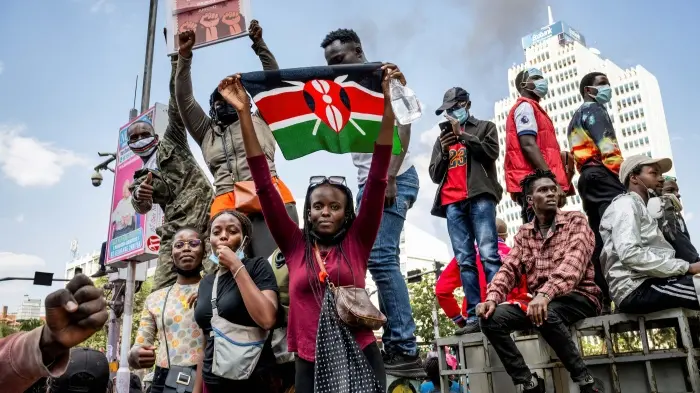The violent unrest that compelled Kenya’s president to withdraw support for a finance bill has cast doubt on the country’s ability to meet International Monetary Fund (IMF) targets and may lead to higher borrowing costs, according to investors and analysts.
The proposed bill, which included unpopular taxes on bread, vegetable oil, sugar, mobile-money transfers, and certain imports, aimed to generate 346 billion Kenyan shillings (Rs 22,347 crore), equivalent to 3 percent of GDP, as noted by Morgan Stanley’s Neville Z. Mandimika.
Mandimika suggested that the bill’s withdrawal could result in Kenya missing the fiscal deficit targets set by the IMF, which are 4.7 percent for this year and 3.5 percent for the next year.
Also read: World Bank Approves $1.2 Billion Credit for Kenya

1 Dead As Police Resort To Live Bullets On Kenyan Tax Protests | Photo Credit – Kenya Times
The IMF has not yet commented on any potential adjustments to Kenya’s required targets. Julie Kozack, an IMF spokesperson, stated, “Our main goal in supporting Kenya is to help it overcome the difficult economic challenges it faces and improve its economic prospects and the well-being of its people.”
Kenya secured a four-year loan with the IMF in 2021 and further agreed to additional lending for climate change measures in May 2023, bringing its total IMF loan access to US$3.6 billion (Rs 30,016 crore).
The IMF mandates regular reviews of reforms, every six months for Kenya, before releasing funding tranches. Earlier this month, Kenya reached a staff-level agreement with the IMF on a seventh review, which preceded President William Ruto’s withdrawal of the tax bill.
This agreement, theoretically paving the way for $976 million (Rs 8,137 crore), had not yet received crucial IMF board approval.
For comments, Feedback and Opinions do get in touch with our editor on WhatsApp: +44 7949 297606

For comments, Feedback and Opinions do get in touch with our editor on WhatsApp: +44 7949 297606.
